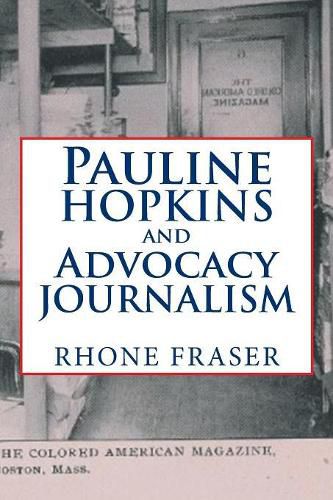Readings Newsletter
Become a Readings Member to make your shopping experience even easier.
Sign in or sign up for free!
You’re not far away from qualifying for FREE standard shipping within Australia
You’ve qualified for FREE standard shipping within Australia
The cart is loading…






This title is printed to order. This book may have been self-published. If so, we cannot guarantee the quality of the content. In the main most books will have gone through the editing process however some may not. We therefore suggest that you be aware of this before ordering this book. If in doubt check either the author or publisher’s details as we are unable to accept any returns unless they are faulty. Please contact us if you have any questions.
In the 1905 letter to William Monroe Trotter, Pauline Hopkins wrote that she lost the editorship of the Colored American Magazine because she refused partisan lines and pursued an independent course. This book focuses on how her editorship promoted an advocacy journalism that sought to abolish Jim Crow. The work of the magazine under her editorship pursued an independent course because it included in-depth biographical sketches of those whose lives she, before many, deemed important to know, such as Toussaint L'Ouverture and Harriet Tubman. Hopkins pursued an independent course also as a novelist, particularly in her first novel Contending Forces, a work unique for a narrator that tried to, in Hopkins’s words, raise the stigma of degradation from my race. Her following three novels were serialized in the Colored American Magazine. Her 1901 novel Hagar’s Daughter is about the attempt of two generations to assimilate within the Washingtonian elite, her 1902 novel Winona exposes the effect of Washington’s 1850 Fugitive Slave Law on enslaved children, and her 1903 novel Of One Blood explores what it means for an individual socialized in the West to, in Hopkins’s words, curse the bond of the white race. In Dr. Rhone Fraser’s, close reading of her fiction, he looks at how her protagonists in each novel pursue an independent course and in his final chapter he compares her essential work to Black journalists of the twenty first century who, like her, refused partisan lines and pursued an independent course. Pauline Hopkins’s work was not just the work of a typical journalist, but the work of an advocate.
$9.00 standard shipping within Australia
FREE standard shipping within Australia for orders over $100.00
Express & International shipping calculated at checkout
This title is printed to order. This book may have been self-published. If so, we cannot guarantee the quality of the content. In the main most books will have gone through the editing process however some may not. We therefore suggest that you be aware of this before ordering this book. If in doubt check either the author or publisher’s details as we are unable to accept any returns unless they are faulty. Please contact us if you have any questions.
In the 1905 letter to William Monroe Trotter, Pauline Hopkins wrote that she lost the editorship of the Colored American Magazine because she refused partisan lines and pursued an independent course. This book focuses on how her editorship promoted an advocacy journalism that sought to abolish Jim Crow. The work of the magazine under her editorship pursued an independent course because it included in-depth biographical sketches of those whose lives she, before many, deemed important to know, such as Toussaint L'Ouverture and Harriet Tubman. Hopkins pursued an independent course also as a novelist, particularly in her first novel Contending Forces, a work unique for a narrator that tried to, in Hopkins’s words, raise the stigma of degradation from my race. Her following three novels were serialized in the Colored American Magazine. Her 1901 novel Hagar’s Daughter is about the attempt of two generations to assimilate within the Washingtonian elite, her 1902 novel Winona exposes the effect of Washington’s 1850 Fugitive Slave Law on enslaved children, and her 1903 novel Of One Blood explores what it means for an individual socialized in the West to, in Hopkins’s words, curse the bond of the white race. In Dr. Rhone Fraser’s, close reading of her fiction, he looks at how her protagonists in each novel pursue an independent course and in his final chapter he compares her essential work to Black journalists of the twenty first century who, like her, refused partisan lines and pursued an independent course. Pauline Hopkins’s work was not just the work of a typical journalist, but the work of an advocate.